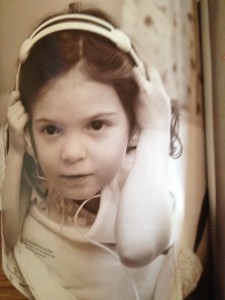 |
| Photo from Today’s Parent, this was an article I wrote for them that was published in 2008. |
This is Ainsley. Some of you know her well. Others have never met her and that’s okay. You just need to know she has multiple disabilities, aka special needs. That’s the sad fact of prenatal alcohol and poly-substance exposure. It hurts your brain, in fact it can often cause brain damage when you are in utero. (before you are born). I have seen children with FASD, fetal alcohol spectrum disorder, whose brains are essentially mapped with holes in places where another child would have regular connections. Her diagnoses, like a lot of children who are adopted from foster care are lengthy. They start with SPD and end with FASD. They are all challenging for everyone. I don’t dispute that at all. I am her mother. I know more than most how hard FASD is. But even on my worst day, or your worst day, or a teacher’s worst day, nothing touches how FASD feels for her. It is chronically waking up and forgetting things. It is everything being too bright or too loud, too tight or too scratchy. It’s forgetting how to draw the number 5, or how to zipper up your sweater. It’s not being able to understand social rules, in much the same way many kids with autism often cannot understand social interactions. It is flaming out when the adults at school fail you, or get lazy, or complacent. It’s lashing out often when nobody is watching for the triggers. FASD is a sneaky thing, tricking people who are supposed to help, into thinking because you’ve had a good month your brain injury must be gone.
This is my daughter with Deb Matthews, and me at her regular levy at New Year’s. We attend yearly because we donate to Deb Matthews’ book drive. As well, I run a non profit that helps advocate for the needs of adoptive families. We are volunteer based and we advocate at all levels for support for kids like Ainsley, and help for our families. Our families often need a higher level of support, due to education conflicts, a high rate of mental health issues present in adoptees and health issues. Ainsley often comes with me when we speak to groups at Children’s Aid about how to parent a child with special needs if you adopt a child with FASD like Ainsley. She often tells the prospective parents what school gets wrong.
This month Ainsley has been consistently under – supported at school. She has a super teacher. But her needs are not met when she is one in 17, or one in 20. Not even close. They are most certainly not met when she is one in 400 on the playground.
The March flame out is a theme that is not uncommon for Ainsley- this has been well documented every March from the time she was about four. She has very difficult times every September, December and March. June can be tricky too. She needs more support, not less during those time periods. She needs full time Educational assistant support. She gets nothing.
There is a plaque in the hall in most schools in London that says Each One Every Day. It’s like that No Child Left Behind credo that exists in the US. It is, in fact, meant to be a pledge that strongly indicates our schools in Ontario are inclusive. It is a very lovely and lofty theory. Meaningless to many parents I know parenting children with special needs. I could write you a list of all the families I know who have been forced to homeschool, but it would be the saddest post ever. Littered with special needs kids discarded by Ontario’s public schools.
If this child were blind there would be a cane. If this child were hearing impaired she might have a hearing aid. If this child were in need of a leg brace to walk it would not be taken from her in an attempt to make her independent. If she had a wheelchair, school would not one day show up and state this year you will walk.
School doesn’t work for kids like Ainsley because she has no cane, hearing aid or wheelchair as a signal to those around her that her disability is every bit as present as a physical disability. There are well known proven strategies for children with FASD, many stemming from the Western provinces where they have learned that children with this disability need lifelong support, one on one help at recess and in unstructured times. lengthy breaks for movement, sensory processing help, cuing, a sensory room – very common in the Western provinces – and an external brain. In essence when the brain is damaged in this manner a one on one support almost round the clock is essential to keep child and school safe. The external brain, is the person who helps the child with FASD function in school and life.
Kids like Ainsley fall through the cracks daily in schools that preach inclusion. That’s not even close to okay. It’s time for a national FASD strategy. It’s time Ontario’s schools made the grade and practiced what they preach. It’s time we did better than paying lip service to inclusion.